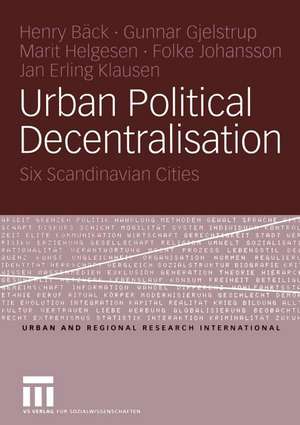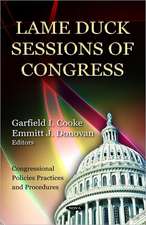Urban Political Decentralisation: Six Scandinavian Cities: Urban and Regional Research International, cartea 5
Autor Henry Bäck, Gunnar Gjelstrup, Marit Helgesen, Folke Johansson, Jan Erling Klausenen Limba Engleză Paperback – 28 ian 2005
Din seria Urban and Regional Research International
-
 Preț: 381.59 lei
Preț: 381.59 lei -
 Preț: 384.70 lei
Preț: 384.70 lei -
 Preț: 414.65 lei
Preț: 414.65 lei -
 Preț: 382.36 lei
Preț: 382.36 lei -
 Preț: 390.46 lei
Preț: 390.46 lei -
 Preț: 387.20 lei
Preț: 387.20 lei -
 Preț: 414.04 lei
Preț: 414.04 lei -
 Preț: 384.86 lei
Preț: 384.86 lei -
 Preț: 387.75 lei
Preț: 387.75 lei -
 Preț: 412.13 lei
Preț: 412.13 lei - 15%
 Preț: 640.06 lei
Preț: 640.06 lei -
 Preț: 395.09 lei
Preț: 395.09 lei
Preț: 380.07 lei
Nou
Puncte Express: 570
Preț estimativ în valută:
72.73€ • 75.78$ • 60.22£
72.73€ • 75.78$ • 60.22£
Carte tipărită la comandă
Livrare economică 03-17 aprilie
Preluare comenzi: 021 569.72.76
Specificații
ISBN-13: 9783810040688
ISBN-10: 3810040681
Pagini: 184
Ilustrații: 179 p. 4 illus.
Dimensiuni: 148 x 210 x 10 mm
Greutate: 0.23 kg
Ediția:2005
Editura: VS Verlag für Sozialwissenschaften
Colecția VS Verlag für Sozialwissenschaften
Seria Urban and Regional Research International
Locul publicării:Wiesbaden, Germany
ISBN-10: 3810040681
Pagini: 184
Ilustrații: 179 p. 4 illus.
Dimensiuni: 148 x 210 x 10 mm
Greutate: 0.23 kg
Ediția:2005
Editura: VS Verlag für Sozialwissenschaften
Colecția VS Verlag für Sozialwissenschaften
Seria Urban and Regional Research International
Locul publicării:Wiesbaden, Germany
Public țintă
ResearchCuprins
Foreword.- 1: Metropolitan Regions and Urban District Councils.- The constitutions of the cities.- Strength of the party system.- Urban district councils.- Six urban decentralisation reforms in three countries.- The chapters to follow.- 2: The institutional structure of the Urban District Councils.- Actors and preferences.- Tasks.- Resources.- City implementation and community networking.- 3: Methodological considerations.- The survey data.- The comparability of survey questions.- How we wrote this book.- 4: Citizen participation in urban district politics.- Comments on the data.- Differences between the cities.- How can the differences between the cities be explained?.- Summary and conclusions.- 5: The politicians in the UDC.- Group representation.- Attitudes towards UDCs.- Dimensions of conflicts within UDCs.- The relationship between politicians and civil servants.- Contacts with citizens.- Contacts with voluntary organisations.- Willingness to run again.- Conclusions.- 6: District politicians on central-local relations.- The electoral dimension.- The task dimension.- Intra-party co-ordination.- Summary and conclusions.- 7: Efficiency in service provision.- A note on the concept of efficiency.- A comment on the methodology.- Size of UDCs.- UDC funding and resources.- UDC organisation.- User involvement.- Summary and conclusion.- 8: Transverse processes.- Major findings.- The role of politicians.- The role of the administration.- The role of co-workers.- The role of users.- Conclusion.- 9: Conclusions: Institutions, time and politics.- Citizen participation.- The district politician’s role.- UDC members and inter-level relations.- Efficiency in service provision.- Transverse processes.- Effects of the institutional set-up.- Time.- Politics.- The self-destructivedynamic of party politics and urban decentralisation.- References.
Notă biografică
Henry Bäck, Professor of Public Administration, Göteborg University; Gunnar Gjelstrup, Senior Lecturer, Roskilde University; Marit Helgesen, Researcher, Norwegian Institute for Urban and Regional Research, Oslo; Folke Johansson, Associate Professor of Political Science, Göteborg University; Jan Erling Klausen, Researcher, Norwegian Institute for Urban and Regional Research, Oslo
Textul de pe ultima copertă
Intra-municipal decentralisation in Scandinavian cities is unique with regard to the volume of services devolved to urban districts. The book investigates the democratic and efficiency effects of decentralisation reforms in six major Scandinavian cities. Special attention is given to consequences of different institutional arrangements as well as to providing an understanding of reform processes. Data for the descriptions and analyses are provided by a number of sources: Surveys with district politicians and samples of citizens, published evaluation reports and interview data from three case studies especially done for this study. Institutional arrangements differ between Copenhagen with relatively autonomous districts and Swedish and Norwegian cities whose districts are more closely integrated with the centre. These differences do matter, both with regard to reform effects and the trajectories of reform processes. Institutionalisation, adaptation and power seeking behaviour of political parties are important factors for understanding the reform processes.
Caracteristici
Decentralisation in Scandinavian Cities













